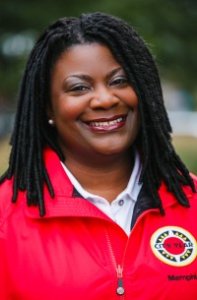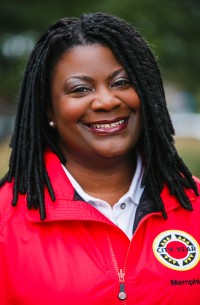An Interview with Dr. Catherine Cushinberry, Vice-President/Executive Director, City Year Memphis
Born and raised in Memphis, TN, Dr. Catherine Cushinberry is a seasoned nonprofit executive with over twenty years of experience in the education and nonprofit sectors. In this interview, she reflects on her leadership journey, moments of clarity that resulted in her taking leaps of faith, and how she manages to stay grounded during challenging times.
For more about the series, Black & Bold: Perspectives on Leadership, click here.
Dr. Catherine Cushinberry, Vice-President/Executive Director, City Year Memphis
Passionate. Strategic. Personable.
Twitter: @drcushinberry
Tell me about your current role.

I am currently vice president and executive director of City Year Memphis, a national nonprofit with over 29 sites. I am responsible for the oversight of this site of City Year, which entails setting the vision, providing strategic direction, and fundraising. Memphis is a fairly new site, so I’ve had the chance to build the team and board; it feels very much like a startup operation. It’s exciting to be creating the culture for what City Year Memphis can be for years to come. I’m also fortunate to be a part of a national network where I can collaborate with headquarters on various projects like conversations around risk assessment and be a part of think tanks for different aspects of our work. (Dr. Catherine Cushinberry pictured at right.)
If there was a soundtrack of greatest hits related to your career, what would make the list?
Two immediately come to mind. T.I.’s song “Motivation” is what I listened to for a portion of my career in nonprofit management. It’s not always what someone else can bring to me; I must be intrinsically driven, no matter what others think. I have to see greatness in who I am. I also must have joy in whatever I do, so Jill Scott’s “Golden” would be the other. I don’t remain in positions that don’t bring me joy or aren’t connected to my passion: children and families.
Work in the social sector can be very personal and linked to one’s values. Can you think of a time when your values were in tension during your career and how you reconciled that tension or not?
I absolutely value working with integrity and conviction. Those two things pour into how I have worked to forward missions of organizations that I’ve worked with. Stay focused on mission and do it with integrity and conviction. One organization where conflict existed was where there was the potential for mission drift. There was a very engaged and overly-involved funder and donor who was willing to invest significantly in the organization, but as a result wanted to have control over decisions that would cause mission drift. I never want anyone to be “the daddy” of my organization. How do we tell a wealthy person “thank you” or “no thank you” because they cannot take us off mission? I had to have a difficult conversation with that funder/donor. There was also someone in my organization who was super supportive of this person and wanted to make decisions through the back door — this colleague worked behind the scenes to undermine me. I was transparent with the staff member and informed them that wasn’t how we were going to work together. It required navigating tough and forthright conversations to avoid taking myself or the organization off course.
Can you share an experience in the workplace where you have had to reclaim your time? What was the context? How did you navigate it? What was the outcome?
It’s always important for me to do work that is meaningful and that I enjoy; it’s a value add to bring my gifts to the table. I lived in Los Angeles and was in a role where the job had really cool potential — I was writing curriculum for parent education programming. However, the nonprofit felt highly corporate, and at that time in my career, as a young professional in my mid-to-late 20’s, it just wasn’t an environment that felt conducive to my growth. I didn’t like walking in the door or being in the building; it felt stuffy and stiff. I would take my lunch break in my car. At that time, there was pressure to stay in a job for five years, but the reclamation of my time was realizing that the role wasn’t bringing me joy. I took a leap of faith and started a consulting business. I got clients very quickly and one project led to me living and working abroad in the Philippines, where I was living my life like it was golden. I consider myself fortunate to have worked internationally. The role in Los Angeles didn’t feel right and I needed to be fearless enough to blaze my own path, and I did.
What’s your approach to self-care? Are there any rituals you use to survive and thrive?
It has taken me a while to identify the importance of self-care and having a regulated approach to it. It is literally another reclamation of time. I’ve most recently regulated yoga and meditation, both at home and at a studio. I keep a yoga mat in my office. Those two activities are quite beautiful in that there is a quiet or calm. Occasionally, at night, I will dream about work, which is so crazy. The meditation helps to calm my mind. I firmly believe where your body goes your mind goes. I also like walking, which helps to slow life down a bit.
I sing…I used to do more publicly, but these days I will take a drive and sing to let emotions out, so I don’t pen up intense feelings. There’s also time with a small group of friends. Some thrive on big dinners and being with big groups. My self-care comes in a group with two to three people where we can have really good personal conversations, laugh, let our hair down — this blesses me tremendously. I have to wear so many hats, so when I can take them off it’s good for my soul.
We come from a resilient and strong lineage. How would you describe the type of ancestor you want to be and why?
It’s meaningful to me to ultimately be a legacy builder. Earlier, I mentioned passion. My work is about youth, families, and children. Some do their work for nature, arbor, animals, the humane society. My specific gifts go towards families and children. The opportunities I have been afforded have not been my own. Over the years, I have gathered many mentees, and as part of my legacy I want to be perceived and known as someone who has spoken from a place of wisdom. I pour into other people and would love to be able to leave that across the lives that I am able to meet…working from thoughtful wisdom and not erratic emotion. I want to always be caring towards those around me because in that way, I personally live my love, care, and passion for the well-being of people that exceeds any professional role.
What advice would you offer other Black women trying to develop or amplify their voice and become self-advocates?
Work from a space of excellence and not perfection. You can’t fulfill the journey if you’re seeking perfection. Excellence is attainable. See yourself as standing in your own shadow and that there is always something more that you can do. You can confidently ask for the things that your heart desires when you know who you are and what you are able to do, and you’ve done enough to trust yourself. When there is not a path that others can make for you, then you blaze your own trail. Always do it with the purpose of making yourself proud. If you do that, then others will also be proud of you and want to work with you.
If you could change the social sector in a way that would benefit, lift up, or affirm Black women, what would that change be?
If I could wave a magic wand to change some things, I would change hearts and minds about how folks perceive Black women and our ability to lead. We are professionals with a range of skills, who know how to set a vision, how to strategically get there, and are fiscally wise in how we manage the work. We know how to move in silence and have the conversations that need to be had. With the changing of minds, I hope it would change how many seats are available at the able: put chairs around the table to make room for women of color who do good work because we can do the work with a high level of excellence. Once we get to table, if we are delivering (which we can and will), then there’s a ripple effect. That’s the reality of life. It doesn’t mean that someone else has to move in order for us to be at the table, but it might. If those in positions of power and influence widen their gaze, it could be a game changer for the ways that Black women are leading, nationally and internationally. That’s a big wand.



Comment section